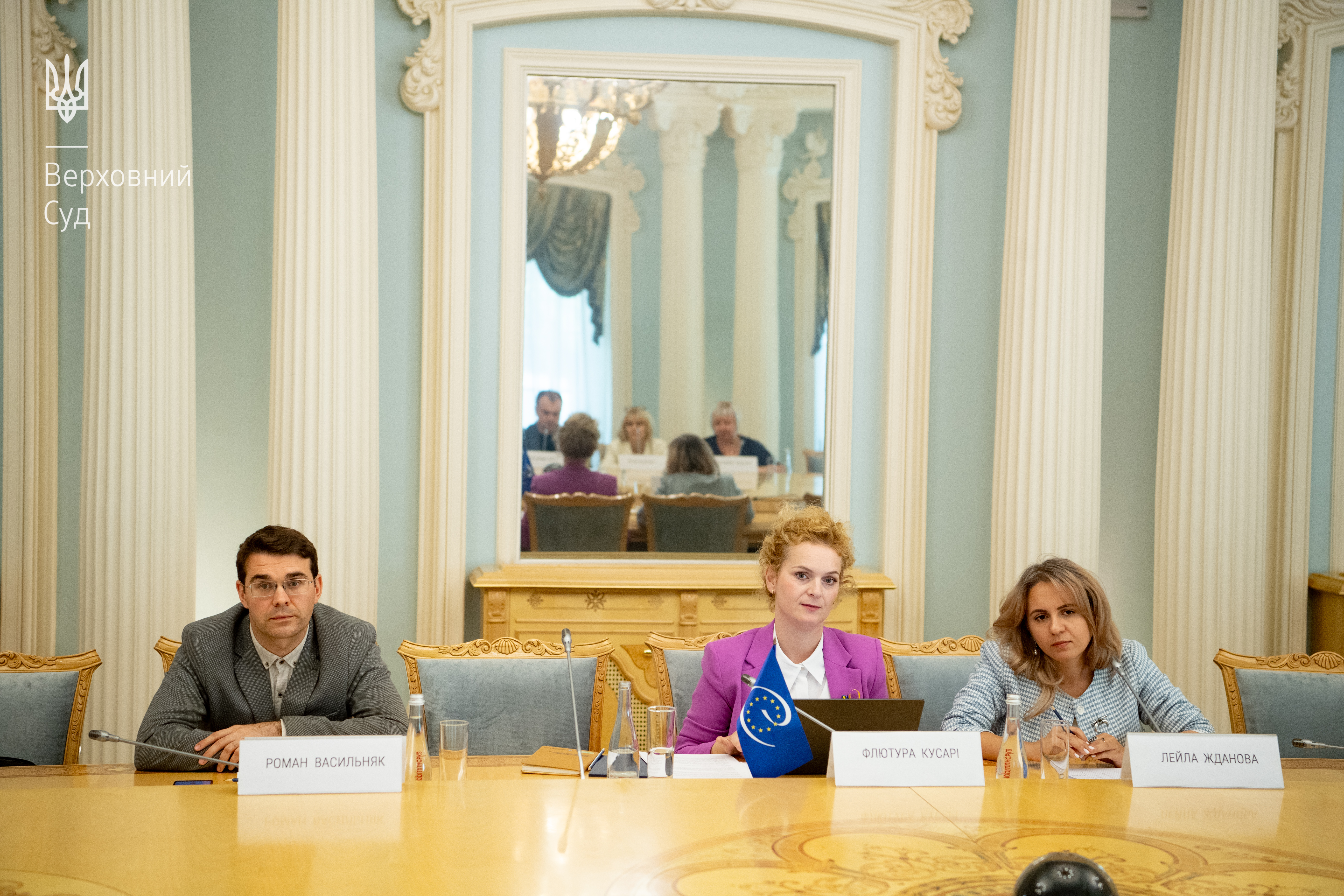Contact center of the Ukrainian Judiciary 044 207-35-46

Counteracting the use of strategic lawsuits against public participation (SLAPPs), the adoption of new European standards governing SLAPPs, and the approximation of Ukrainian legislation to these standards - these issues were the focus of the Supreme Court judges and representatives of the Council of Europe at a bilateral meeting.
In early 2024, the Council of Europe adopted new European standards governing SLAPPs. These are the Council of Europe Recommendation CM/Rec(2024)2 and Directive (EU) 2024/1069 of the European Parliament and of the Council on the protection of persons taking part in public life against manifestly unfounded claims or abuse of legal proceedings.
The participants of the meeting discussed issues related to strategic lawsuits in terms of procedural law in civil, administrative and criminal cases, as well as cases against media and journalists.
Supreme Court Judge of the Administrative Cassation Court Yan Bernaziuk noted that Ukraine has improved its standards of freedom of speech after the Revolution of Dignity. And even in such a difficult time as now, the government, parliament and judiciary are trying to protect freedom of speech in Ukraine. It is very important to distinguish freedom of speech and free journalism from propaganda and disinformation. The development of additional CoE recommendations will certainly have a positive outcome for Ukraine as it moves towards EU membership.
Flutura Kusari, an international expert of the Council of Europe, stressed that Ukraine, in the context of the Council of Europe's project ‘Protecting Freedom of Speech and Media Freedom in Ukraine,’ was the first country to officially launch a national campaign. This meeting is necessary to determine how close the Ukrainian system is to European standards. The expert added that in some countries, judicial councils have adopted programmes that give priority to cases involving journalists.

Vasyl Krat, Supreme Court Judge of the Civil Cassation Court, speaking about SLAPPs, noted that it is necessary to distinguish between abuse of procedural rights and abuse of substantive (civil) rights. These legal constructs differ both in essence and in the legal consequences of their application by the court. In case of abuse of procedural rights, the court has the right to leave without consideration or return a complaint, application, petition, lawsuit, or apply other measures of procedural coercion. Instead, the legal consequence of the abuse of substantive (civil) rights may be, in particular, a refusal to protect a civil right and interest, i.e. dismissal of a claim. This has been repeatedly pointed out by the Court of Cassation.
The judge stressed that in the case of Memo LLC v. Russia (no. 2840/10) of 16 June 2022, the ECHR, when considering the application, took into account the commentary of the Council of Europe Commissioner for Human Rights of 27 October 2020, 'Time to act against SLAPPs', in which he stated that the purpose of such lawsuits is not to win the case, but to divert time and energy to suppress legitimate criticism. The plaintiffs in such lawsuits are usually more interested in the process itself than in the outcome of the case. It is important to distinguish between abuse of procedural rights and abuse of substantive (civil) rights. If the fact of abuse of procedural rights is established, the court has the right to dismiss or return the complaint, application, petition, claim or apply other measures of procedural coercion. The judge recalled that since 2019, the Joint Chamber of the CivCC of the Supreme Court has consistently stated that the task of civil proceedings is to effectively protect violated, unrecognised or disputed rights, freedoms or interests, so such protection is possible provided that the rights, freedoms or interests of the plaintiff are actually violated and the participants use civil proceedings for such protection. Private law instruments (in particular, the initiation of a dispute for the protection of honour, dignity and business reputation, and not for the protection of civil rights and interests) should not be used by the parties for a purpose that is contrary to or inconsistent with the task of civil proceedings. The speaker also noted that the Supreme Court was considering a case on the protection of honour, dignity and business reputation brought against an environmental protection organisation and its members, in which the Court of Cassation was resolving the procedural issue of succession and whether the obligation to compensate for moral damages and legal costs was hereditary.
The meeting was also attended by Supreme Court Judge of the Criminal Cassation Court Svitlana Yakovleva, Secretary of the Second Judicial Chamber of the Criminal Cassation Court within the Supreme Court Nataliia Bilyk, Programme Manager of the project ‘Protecting Freedom of Speech and Media Freedom in Ukraine’ Leila Zhdanova, media lawyer Roman Vasylniak and Head of the Division for International Cooperation Lina Hubar.